- Home
- Evelyn Waugh
Unconditional Surrender Page 2
Unconditional Surrender Read online
Page 2
It was through Jumbo’s offices that he now sat at ease behind a FANNY driver instead of travelling by bus. After four years of war Jumbo preserved his immunity to sumptuary regulations. As also did Ruben. In a famine-stricken world the little fish-restaurant dispensed in their seasons Colchester oysters, Scotch salmon, lobsters, prawns, gulls’ eggs, which rare foods were specifically exempt from the law which limited the price of hotel meals to five shillings, and often caviar, obtained, only Ruben knew how, through diplomatic channels. Most surprising of all there sometimes appeared cheeses from France, collected by intrepid parachutists and conveyed home by submarine. There was an abundance of good wine, enormously costly, at a time when the cellars of the hotels were empty and wine merchants dealt out meagre monthly parcels only to their oldest customers. Ruben had for some years enjoyed a small and appreciative clientèle. Once he had served in Bellamy’s and there were always tables for its members. There was also an increasing dilution of odd-looking men who called the proprietor ‘Mr Ruben’ and carried large quantities of bank notes in their hip pockets. That restaurant was a rare candle in a dark and naughty world. Kerstie Kilbannock, who had made noxious experiments with custard powder and condiments, once asked: ‘Do tell me, Ruben, how do you make your mayonnaise?’ and received the grave reply: ‘Quite simply, my lady, fresh eggs and olive oil.’
Guy led Jumbo to a corner table. He had spent little time in London since his return from Egypt and he could seldom afford to feast, but Ruben was loyal to old faces and familiar names.
‘Rather a change from the Senior,’ Jumbo remarked as he surveyed the company. ‘A great change,’ he added as he read the menu. They consumed great quantities of oysters. As they rose surfeited from their table, it was seized by a couple who had just come in; Kerstie Kilbannock and an American soldier. As though playing musical chairs, she was in Jumbo’s warm place before he had taken his cap from the peg above him.
‘Guy, how are you?’
‘Forty.’
‘We’ve been lunching with Ruby at the Dorchester and are so hungry we had to pop in here and fill up. You know the Lootenant?’
‘Yes, indeed. How are you, Loot?’
Everyone knew Lieutenant Padfield; even Guy who knew so few people. He was a portent of the Grand Alliance. London was full of American soldiers, tall, slouching, friendly, woefully homesick young men who seemed always in search of somewhere to sit down. In the summer they had filled the parks and sat on the pavements round the once august mansions which had been assigned to them. For their comfort there swarmed out of the slums and across the bridges multitudes of drab, ill-favoured adolescent girls and their aunts and mothers, never before seen in the squares of Mayfair and Belgravia. These they passionately and publicly embraced, in the blackout and at high noon, and rewarded with chewing-gum, razor-blades, and other rare trade-goods from their PX stores. Lieutenant Padfield was a horse of a different colour; not precisely, for his face, too, was the colour of putty; he too slouched; he, too, was a sedentary by habit. But he was not at all homesick; when not in a chair he must have been in rapid motion, for he was ubiquitous. He was twenty-five years old and in England for the first time. He had been one in the advanced party of the American army and there was no corner of the still intricate social world where he was not familiar.
Guy first met him when on leave he went reluctantly to call on his uncle Peregrine. This was during the Loot’s first days in England.
‘…Brought a letter from a fellow who used to come to Cowes. Wants to see my miniatures…’
Then during the same week Guy was asked to dinner at the House of Commons by his brother-in-law Arthur Box-Bender.
‘…Told we ought to do something about some of these Americans. They’re interested in the House, naturally. Do come along and give a hand….’ There were six young American officers, the Loot among them.
Very soon he had ceased to be a mere member of the occupying forces to whom kindness should be shown. Two or three widows survived from the years of hospitality and still tried meagrely to entertain. The Lieutenant was at all their little parties. Two or three young married women were staking claims to replace them as hostesses. The Loot knew them all. He was in every picture gallery, every bookshop, every club, every hotel. He was also in every inaccessible castle in Scotland, at the sick bed of every veteran artist and politician, in the dressing-room of every leading actress and in every university common-room, and he expressed his thanks to his hosts and hostesses not with the products of the PX stores but with the publications of Sylvia Beach and sketches by Fuseli.
When Guy went to have his hair cut the Loot seemed always to be in the next chair. One of the few places where he was never seen was HOO HQ. He had no apparent military function. In the years of peace he had been the junior member of an important firm of Boston lawyers. It was said that the Loot’s duties were still legal. Either the American army was exceptionally law-abiding or they had a glut of advocates. The Loot was never known to serve on a court-martial.
Now he said: ‘I was at Broome yesterday.’
‘Broome? You mean our Broome? What on earth took you there, Loot?’
‘Sally Sackville-Strutt has a daughter at the school. We went to see her play hockey. She’s captain of “Crouchback”. You knew the school was divided into two houses called “Crouchback” and the “Holy Family”?’
‘The invidious distinction has been remarked on.’
‘“Crouchback” won.’ He began beckoning to Ruben. ‘Do we meet tonight at the Glenobans?’
‘No.’
‘Did you go to see the Sword of Stalingrad? I went when it was first on view at the Goldsmiths’ Hall. I think it is a very lovely gesture of your king’s but there was a feature no one could explain to me – the escutcheon on the scabbard will be upside down when it is worn on a baldric.’
‘I don’t suppose Stalin will wear it on a baldric.’
‘Maybe not. But I was certainly surprised at your College of Arms passing it. Well I’ll be seeing you around.’
‘Around’ was the right word.
‘Pretty fair cheek that young American finding fault with the sword,’ said Jumbo as they left the restaurant. ‘What’s more he didn’t discover the mistake. There was a letter about it in The Times weeks ago. I’ll drop you back at your office. Can’t have you using public transport on your birthday. I haven’t anything much on this afternoon. That was the best lunch I’ve had for three years. I may take a little nap.’
In the autumn of 1943 Hazardous Offensive Operations Headquarters was a very different organization from the modest offices which Guy had visited in the winter of 1940. The original three flats remained part of their property – an important part, for they housed Ian Kilbannock’s busy Press service – as did numerous mansions from Hendon to Clapham in which small bands of experts in untroubled privacy made researches into fortifying drugs, invisible maps, noiseless explosives, and other projects near to the heart of the healthy schoolboy. There was a Swahili witch-doctor in rooms off the Edgware Road who had been engaged to cast spells on the Nazi leaders.
‘D’you know, Charles, I sometimes think that black fellow’s something of a charlatan,’ General Whale once remarked to Major Albright in a moment of confidence. ‘He indents for the most extraordinary stores. But we know Hitler’s superstitions and there’s a good deal of evidence that with superstitious people these curses do sometimes work.’
Even Dr Glendening-Rees, fully recovered from the privations of Mugg, had a dietary team in Upper Norwood, from whose experiments batches of emaciated ‘conscientious objectors’ were from time to time removed to hospital. But the ostensible authority of these activities resided in the Venetian-Gothic brick edifice of the Royal Victorian Institute, a museum nobly planned but little frequented in the parish of Brompton. Its few valuable exhibits had been removed to safe storage. Other less portable objects had been left to the risks of bombardment and still stood amid the labyrinth of ply-board parti
tions with which the halls were divided.
The compartment assigned to the Special Service Forces Liaison Office – Guy’s – was larger than most but there was little floor space for he shared it with the plaster reconstruction of a megalosaurus, under whose huge flanks his trestle table was invisible from the door. This table carried three wire trays ‘In’, ‘Out’, and ‘Pending’, all empty that afternoon – a telephone, and a jig-saw puzzle. For the first few days of his occupancy he had had an AT secretary but she had been removed by a newly installed civilian efficiency-expert. Guy did not repine, but to fill his time, he prosecuted a controversy on the subject. Tommy had said he did not know what the liaison office was supposed to do; nor did Guy.
A captain of Marines peered round the giant carnivore and presented him with a file marked: Operation Hoopla. Most Secret. By Hand of Officer only.
‘Will you minute this and pass it on to “Beaches”?’
‘I thought “Hoopla” had been cancelled.’
‘Postponed,’ said the Marine. ‘The party we had in training was sent to Burma. But we’re still working on it.’
The intention of ‘Hoopla’ was to attack some prodigious bomb-proof submarine-pens in Brittany. A peremptory demand for Immediate Action against these strongholds had been received from the War Cabinet. ‘If the Air Force can’t destroy the ships, we can kill the crews,’ General Whale had suggested. Twelve men were to perform this massacre after landing in a Breton fishing boat.
The latest minute read:
In view of Intelligence Report C/806/RT/12 that occupied France is being supplied with ersatz motor fuel which gives an easily recognizable character to exhaust fumes, it is recommended that samples of this fuel should be procured through appropriate agency, analysed, reproduced, and issued to Hoopla Force for use in auxiliary engine of fishing boat.
Someone before Guy had added the minute: Could not a substance be introduced into standard fuel which would provide a characteristic odour of ersatz?
Someone else, an admiral, had added: It was decided (see attached minute) that auxiliary engine should be used only under a strong offshore wind. I consider risk of detection of odour negligible in such circumstances.
Guy more modestly wrote: Noted and approved. Guy Crouchback, Capt. for Brig. Commander S.S. Forces, and squeezed past the megalosaurus to carry the file on its way.
‘Beaches’ was rather a jovial room. It housed an early Victorian locomotive engine, six sailors, and a library of naval charts. The reappearance of ‘Hoopla’ was here greeted with ironic applause. Some time back General Whale had forfeited the kindly sobriquet of ‘Sprat’ and was now known in the lower and more active regions of his command as ‘Brides-in-the-bath’; for the reason that all the operations he sponsored seemed to require the extermination of all involved.
Next door to ‘Beaches’ there lived three RAF sergeants in what was called ‘the studio’. Here beaches were constructed in miniature, yards and yards of them, reproducing from air-photographs miles and miles of the coast of occupied Europe. The studio was full of tools and odd scraps of material, woods, metals, pastes, gums, pigments, feathers, fibres, plasters, and oils many of them strongly aromatic. The tone was egalitarian in an antiquated, folky way distantly derived from the disciples of William Morris. Two of the sergeants were mature craftsmen; one, much younger, wore abundant golden curls such as the army would have cropped. He was addressed as ‘Susie’ and like his predecessors in the Arts and Crafts movement professed communism.
In their ample spare time these ingenious men were building a model of the Royal Victorian Institute. Guy took every opportunity to visit them and admire their work, as it daily grew in perfection. He paused there now.
‘Been to see the Stalingrad sword?’ Susie asked. ‘Nice bit of work. But I reckon a few machine guns would be more to the point.’
He was addressing a tall, grey civilian dandy who stood nonchalantly posed beside him twirling a single eye-glass on its black cord. This was Sir Ralph Brompton, the diplomatic adviser to HOO HQ. He seemed a figure of obsolescent light comedy rather than of total war.
‘It affords the People an opportunity for self-expression,’ said Sir Ralph.
He was a retired ambassador who daily patrolled the building in the self-imposed task of ‘political indoctrination’; an old man with a mission, but in no hurry.
He had called on Guy and after a very few words had despaired of him as a sympathetic subject. He did not now disguise his annoyance at being found with Susie.
‘I just dropped in,’ he said, half to Guy, half to the senior sergeant, ‘to see if you were getting the Foreign Affairs Summary regularly.’
‘I don’t know,’ said the senior sergeant. ‘Are we, Sam?’ He looked vaguely round the littered work-benches. ‘We don’t get bothered with much paper work here.’
‘But you should,’ said Sir Ralph. ‘I make a special point of it being circulated to all ranks. Much devoted labour went into the last issue. You have to read between the lines sometimes. I’m at a disadvantage in saying quite all that needs saying in black and white. There is still a certain amount of prejudice to be cleared up – not in the highest quarters, of course, or among the People. But half way down,’ he said, gazing at Guy through his single eye-glass, without animosity seeing him with his back to a wall, facing a firing squad. ‘One learns a certain amount of professional discretion in my absurd occupation. There will be no need for that after the war. Meanwhile one can only hint. I can tell you the main points: Tito’s the friend, not Mihajlovic. We’re backing the wrong horse in Malaya. And in China too. Chiang is a collaborationist. We have proof. The only real resistance is in the northern provinces – Russian trained and Russian armed, of course. They are the men who are going to drive out the Japs. It’s all in the Summary if you read it attentively. I’ll get you a copy. Don’t forget this evening, Susie. I’m afraid I can’t be there myself, but they are counting on you.’
He sauntered out twirling his eyeglass.
‘What are you and that old geezer up to?’ asked Sam.
‘Party meeting,’ said Susie.
‘I know better things to do in the blackout than meetings.’
‘So does the old geezer, it seems,’ said the third sergeant.
‘He’s a bit of a bourgeois at heart for all his fine talk,’ Susie admitted. All the time he spoke he was concentrating on his small lathe, turning tiny spiral columns with exquisite precision.
‘You’ll soon have that finished,’ said Guy to the senior sergeant.
‘Yes, barring interruptions. You can never tell when they’ll come asking for more beaches. There isn’t the same satisfaction in beaches.’
‘They ought to have landed on them this summer,’ said Susie. That’s what was promised.’
‘I didn’t give no promises,’ said Sam, busy with the fretsaw cutting little mahogany flagstones.
Guy left these happy, industrious men and paused in his progress at the room of Mr Oates, the civilian efficiency expert.
No one could be reasonably described as ‘out of place’ in HOO HQ, but Mr Oates, despite his unobtrusive appearance (or by reason of it), seemed bizarre to Guy. He was a plump, taciturn little man and he alone among all his heterogeneous colleagues proclaimed confidence. Of the others some toiled mindlessly, passing files from tray to tray, some took their ease, some were plotting, some hiding, some grousing; all quite baffled. But Mr Oates believed he was in his own way helping to win the war. He was a profoundly peaceful man and his way seemed clear before him.
‘Any result of my application for the return of my typist?’
‘Negative,’ said Mr Oates.
‘Kilbannock has three typists.’
‘Not now. I have just withdrawn two of them. There is another, Mrs Troy, who is officially attached to him but her work seems mainly extramural. In fact her position is somewhat anomalous in this headquarters. I shall raise it at the next man-power conference.’
There had
been a showy addition to Mr Oates’s furniture since Guy’s last visit; an elaborate machine of more modern construction than any permanent exhibit in the museum.
‘What have you got there?’
Mr Oates made a little grimace of gratification.
‘Ah! You have found my tender spot. You might call it my pet. Absolutely new. It’s just been flown in from America. It took 560 man hours to install. The mechanics came from America, too. There isn’t another like it in the country.’
‘But what is it?’
‘An Electronic Personnel Selector.’
‘Have we any electronic personnel?’
‘It covers every contingency. For example, suppose I want to find a lieutenant-colonel who is a long-distance swimmer, qualified as a barrister, with experience in catering in tropical countries, instead of going through all the records I just press these buttons, one, two, three, four, and .. .’ there was a whirring noise from the depths of the engine, a series of clicks as though from a slot-machine telling fortunes on a pier, a card shot up. ‘You see – totally blank – that means negative.’
‘I think I could have guessed that.’
‘Yes, I was illustrating an extreme example. Now here’ – he picked up a chit from his tray – ‘is a genuine inquiry. I’ve been asked to find an officer for special employment; under forty, with a university degree, who has lived in Italy, and had Commando training – one, two, three, four, five – whirr, click, click, click, click, click. ‘Here we are. Now that is a remarkable coincidence.’
The card he held bore the name of A/Ty. Captain Crouchbank, G., RC, att. HOO HQ.
Guy did not attempt to correct the machine on the point of his age, or of the extent of his Commando training.
‘I seem the only one.’
‘Yes. I don’t know what it’s for, of course, but I will send your name in at once.’
2
THIRTY-SEVEN years old, six foot two in height, upright, powerful, heavier than he had been in the Middle East and paler, with a hint of flabbiness in the cheeks, wearing service dress, a well-kept Sam Browne belt, the ribbon of the MM and the badges of a Major in the Intelligence Corps; noticeable, if at all, for the pink-grey irises of his eyes; the man whom Hookforce had known as Corporal Major Ludovic paused reminiscently by the railings of St Margaret’s, Westminster.

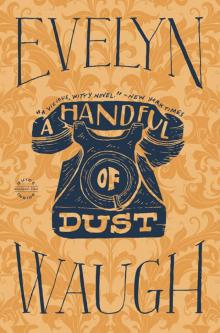 A Handful of Dust
A Handful of Dust Complete Stories of Eveyln
Complete Stories of Eveyln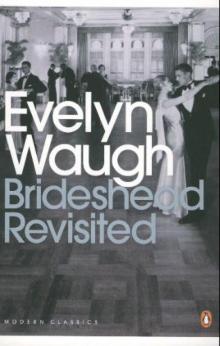 Brideshead Revisited
Brideshead Revisited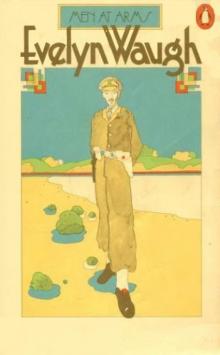 Men at Arms
Men at Arms Black Mischief
Black Mischief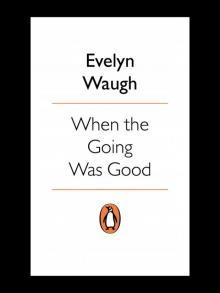 When the Going Was Good
When the Going Was Good Officers and Gentlemen
Officers and Gentlemen Helena
Helena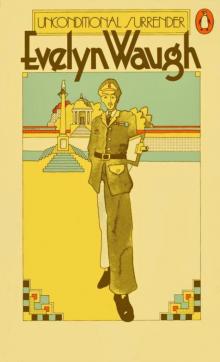 Unconditional Surrender
Unconditional Surrender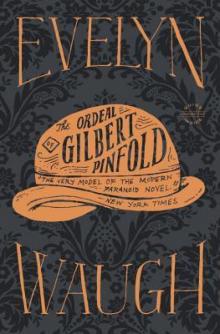 The Ordeal of Gilbert Pinfold
The Ordeal of Gilbert Pinfold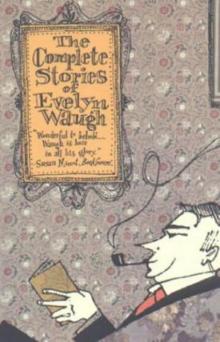 The Complete Stories Of Evelyn Waugh
The Complete Stories Of Evelyn Waugh